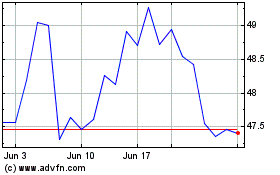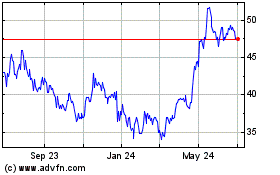Shares of China's Meituan Sink as Beijing's Scrutiny Mounts
May 11 2021 - 7:48AM
Dow Jones News
By Chong Koh Ping and Xie Yu
Once a stock-market darling, online delivery company Meituan has
come under mounting regulatory and public scrutiny in China,
souring investors on its growth prospects amid a broader crackdown
on the country's powerful technology sector.
On Tuesday, shares of Meituan tumbled nearly 10% before paring
some losses to close at a seven-month low. The previous day, the
shares had fallen 7%. The declines took Beijing-based Meituan's
market capitalization to the equivalent of about $195 billion.
Three months ago, Meituan was flying high with a market
capitalization exceeding $340 billion, according to FactSet, as
Chinese consumers swarmed to its mobile app to purchase vegetables,
groceries and household goods in bulk. In April the company raised
nearly $10 billion from investors to fund new technology and
ambitious expansion plans. Even after the recent tumble, Meituan is
China's third-most-valuable listed internet company, behind
videogame developer and social-media company Tencent Holdings Ltd.,
and e-commerce firm Alibaba Group Holding Ltd.
On Monday evening, the Shanghai Consumer Council, a
quasi-government body that protects consumer rights, said it had
summoned Meituan representatives to a meeting and told the company
to address problems that had sparked a litany of complaints from
consumers.
Representatives of Pinduoduo Inc., a fast-growing e-commerce
company that has become one of China's top online shopping sites,
were also called to a meeting by the council and told to rectify
problems that included sales of counterfeit goods. Pinduoduo's
Nasdaq-listed shares plunged 9% in U.S. trading on Monday after the
news.
Meituan, which operates an online marketplace for restaurants
and other merchants, was instructed to resolve issues related to
refunds and its failure to fulfill food-delivery and grocery
orders. The council also said the company had misleading content on
its app and told it not to take advantage of its dominant market
position by charging merchants unreasonable amounts.
Meituan and Pinduoduo both agreed to conduct self-examinations
and revise their businesses according to the council's
requirements, it said.
A day earlier, an internet controversy developed over a
social-media post by Meituan's founder and chief executive, Wang
Xing, containing an ancient Chinese poem that refers to book
burning by a Qin dynasty emperor.
Some internet users interpreted Mr. Wang's post as veiled
criticism of China's government. The poem mocked an emperor who
silenced opposition by intellectuals but was later overthrown by a
couple of military men who didn't read books.
Mr. Wang subsequently deleted the post and said on Fanfou, an
obscure Twitter-like social-media platform he founded, that the
poem was supposed to be a reference to Meituan's competitors. "What
could upstage the delivery business could be companies or business
models that we have yet to discover," he wrote.
Adding to the issues surrounding Meituan, a video that appeared
Monday on popular Chinese news aggregator Sina showed two Beijing
municipal government officials questioning Meituan representatives
about what the company was doing to safeguard the welfare of its
millions of delivery workers who have to pay for accident and
health-insurance coverage.
The video carried the logo of Beijing TV, a state-backed
satellite broadcaster. A Meituan spokesperson confirmed the
authenticity of the video. In late April, the station aired a
program featuring a government official who worked as a delivery
rider for Meituan and earned the equivalent of $6.38 for a 12-hour
shift.
Analysts from Citigroup said in a report Tuesday that the new
requirements for Meituan and Pinduoduo from the Shanghai Consumer
Council are consistent with overall regulatory stances toward
internet platforms in China. A likely outcome could be slower user
and revenue growth for the companies, which may have to spend more
to fix problems and comply with the requirements, they added.
Two money managers who follow Meituan's stock moves said the
company could face higher costs of operating its business if it has
to increase the benefits it provides to its delivery workers or
treat them more like employees.
Chinese regulators have made a concerted push to get the
country's technology giants to compete fairly and protect the
interests of consumers and other stakeholders. Meituan is also in
the crosshairs of China's top commerce regulator, the State
Administration for Market Regulation, which began a probe last
month into the company on suspicion of monopolistic behavior.
Meituan has said it is cooperating with the investigation.
Meituan and Pinduoduo were among nearly three dozen of China's
largest tech companies to publicly pledge to comply with the
country's antimonopoly laws recently, after the commerce regulator
fined Alibaba $2.8 billion and halted the initial public offering
of financial-technology company Ant Group Co.
Write to Chong Koh Ping at chong.kohping@wsj.com and Xie Yu at
Yu.Xie@wsj.com
(END) Dow Jones Newswires
May 11, 2021 07:33 ET (11:33 GMT)
Copyright (c) 2021 Dow Jones & Company, Inc.
Tencent (PK) (USOTC:TCEHY)
Historical Stock Chart
From Mar 2024 to Apr 2024

Tencent (PK) (USOTC:TCEHY)
Historical Stock Chart
From Apr 2023 to Apr 2024
